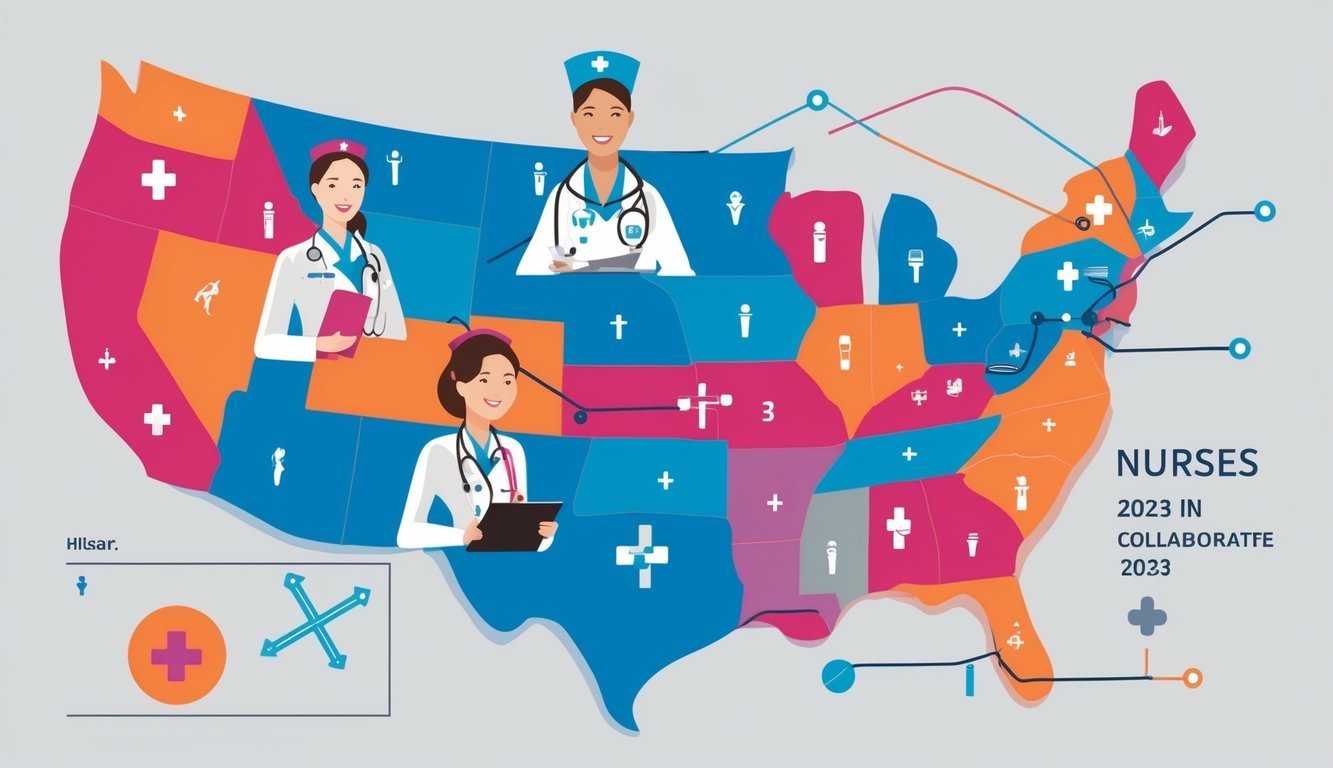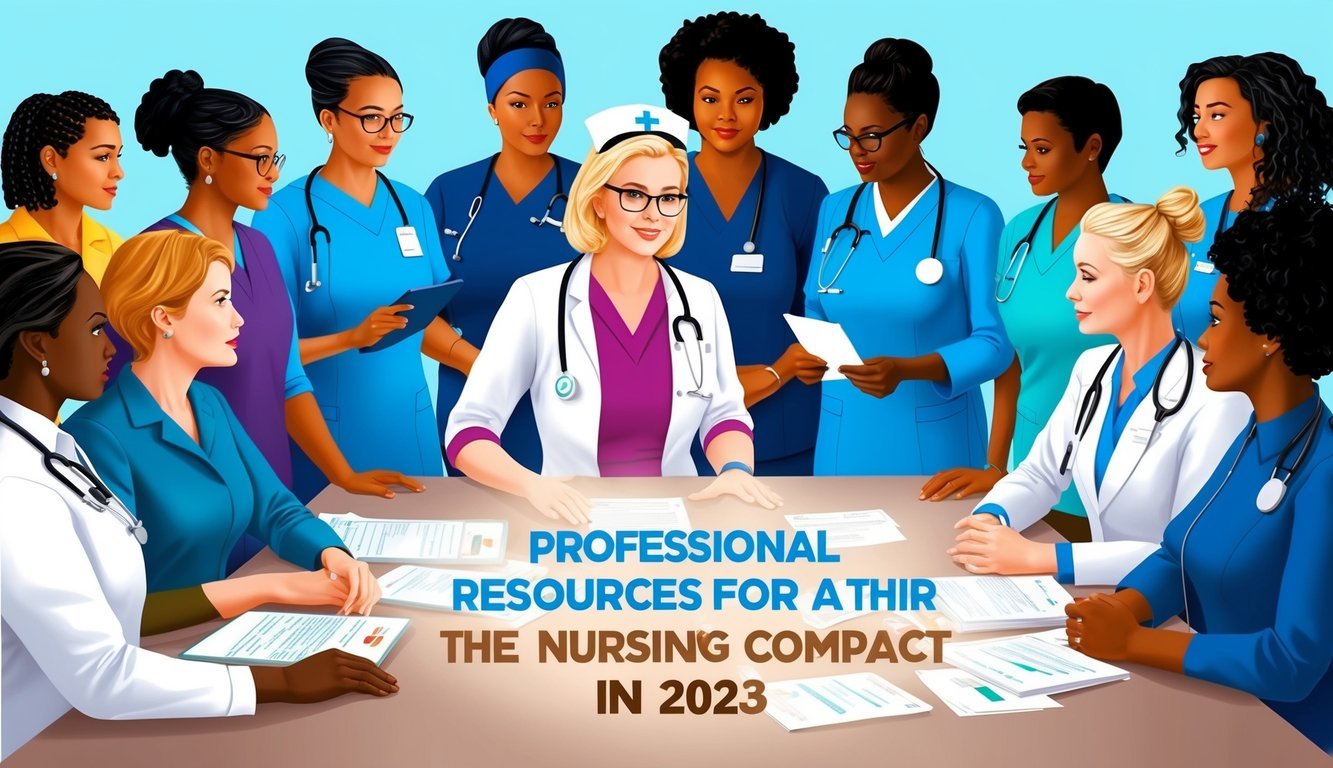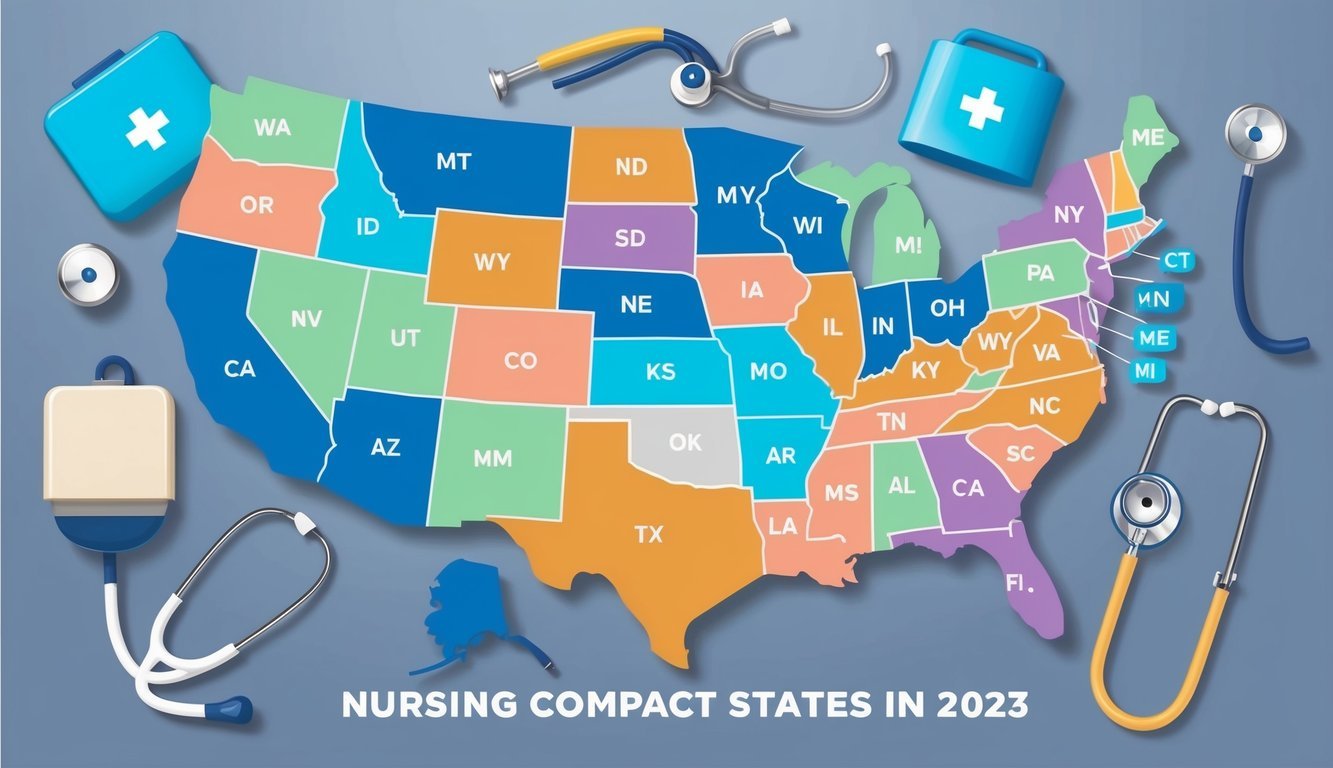The concept of nursing compact states is essential for nurses seeking flexibility in their careers.
In 2023, the Nurse Licensure Compact (NLC) allows you to practice in multiple states with a single compact license.
This means you can provide care where it’s needed most, without the hassle of obtaining separate licenses in each state.
This compact fosters a more mobile nursing workforce, ensuring patients receive timely care while enhancing opportunities for nurses across the country.
The National Council of State Boards of Nursing (NCSBN) oversees the NLC, which currently includes 41 compact nursing states and territories, offering a streamlined path for licensure.
As a nurse, understanding the benefits of this compact can help you make informed decisions about your career and where you want to practice.
By leveraging the NLC, you can expand your career possibilities and meet demand in various healthcare settings.
Navigating the nursing landscape can be complex, but knowing how to take advantage of the compact nursing states can significantly enhance your professional journey.
Familiarize yourself with the list of participating states and the requirements that come with your compact license.
For more detailed information, visit the NCSBN website or explore nursing resources like Nurse.org.
Understanding the Nurse Licensure Compact
The Nurse Licensure Compact (NLC) simplifies the process for nurses to practice across state lines.
With the implementation of the Enhanced Nurse Licensure Compact (eNLC), requirements for multistate licenses have strengthened, allowing for more secure and efficient healthcare delivery.
Basic Principles of the NLC
The NLC enables registered nurses (RNs) and licensed practical/vocational nurses (LPNs/LVNs) to hold one multistate license, which grants them the authority to practice in any compact state.
This compact removes the need for nurses to obtain separate licenses for each state they wish to work in, facilitating easier movement and employment opportunities.
Key details include:
- Authority to practice: Nurses can work both in person and via telehealth.
- Interstate cooperation: Member states coordinate for mutual recognition of licenses.
- Background checks: The eNLC necessitates state and federal fingerprint-based background checks for applicants, enhancing patient safety.
History and Evolution of the Compact
Originally created to address the growing need for nurses, the NLC was introduced to streamline licensure and enhance care delivery across state lines.
The initial version allowed for multistate practice but lacked some critical safety measures.
In 2018, the Enhanced Nurse Licensure Compact (eNLC) was rolled out, introducing stricter standards.
These adjustments aimed to protect patients by ensuring that all practicing nurses meet uniform qualifications.
This evolution reflects a commitment to improving healthcare access while maintaining care quality.
As of now, many states have adopted this updated compact, helping thousands of nurses to work across jurisdictions seamlessly.
For more details, you can check resources like Nurse.org and NCSBN.
State Participation in the Compact
Understanding the current landscape of state participation in the Nurse Licensure Compact (NLC) is essential for healthcare professionals.
This section details which states are actively participating, those with pending legislation, and states that have opted out of the compact.
Current NLC States
As of 2023, 38 states have fully or partially enacted the NLC.
This compact enables Registered Nurses (RNs) and Licensed Practical/Vocational Nurses (LPNs/LVNs) to possess one license valid across multiple states.
Key states with NLC participation include:
- Pennsylvania
- Guam
- Minnesota
- California
- Illinois
These states support interstate practice, particularly benefiting nurses seeking employment flexibility.
As you consider opportunities, be aware that some states, like Alaska and Hawaii, have specific guidelines for licensure that may differ from NLC provisions.
Pending Legislation
Several states are currently assessing or have proposed legislation to join the NLC.
For example:
- Michigan: Legislative discussions are underway to align state regulations with the compact.
- Connecticut: Efforts are ongoing to facilitate participation in the NLC framework.
- Massachusetts: There are talks about the potential adoption of NLC policies.
Monitoring these developments is crucial, as changes could impact your ability to practice across state lines.
Engaging with local nursing associations may provide insights into the progress of these legislative efforts.
States Not Participating
Some states remain outside the NLC framework.
States such as California and Alaska have chosen not to participate, placing restrictions on cross-state nursing practices.
Additionally, states like New York and Hawaii lack NLC implementation, which may impact job mobility for nurses.
It’s important to research licensure requirements in these non-participating states.
If you plan to work in a state that does not participate in the NLC, be prepared to navigate additional licensing processes.
Understanding these parameters can assist you in making informed career decisions.
Licensure Requirements and Process
Understanding the licensure requirements and processes for nursing compact states is essential for your nursing career.
This section details the key components, including qualifications for a compact license, the necessity for criminal background checks, and the process of licensure by endorsement.
Qualifying for a Compact License
To qualify for a compact nursing license, you must meet specific criteria established by the Enhanced Nursing Licensure Compact (eNLC).
First, ensure you are licensed in a state that is part of the compact.
You need to hold an active, unencumbered RN or LPN/LVN license.
Additionally, you must have passed the NCLEX-RN or NCLEX-PN exam and completed an approved nursing program.
Upon fulfilling these criteria, you can apply through the Nursys database for your multi-state license.
Criminal Background Checks
Criminal background checks are a critical component of the licensure process.
The eNLC mandates that applicants undergo state and federal fingerprint-based criminal background checks.
This ensures that all licensed nurses have a clear criminal record, enhancing public safety.
You will need to submit your fingerprints as part of your application, and the results must be reviewed before the issuance of a compact license.
Failure to disclose any prior convictions may lead to application denial or disciplinary actions in the future.
Licensure by Endorsement
If you hold a nursing license from a non-compact state and wish to practice in a compact state, you can apply for licensure by endorsement.
This process typically requires you to prove your educational background, pass the NCLEX, and submit verification from your original licensing authority.
You must also meet the compact state’s specific requirements and possibly provide a criminal background check, depending on state regulations.
Each state has its own rules, so it’s important to check the individual state board of nursing for detailed information.
Impact on Nursing Practice

The Nurse Licensure Compact (NLC) influences nursing practice significantly by enhancing mobility for nurses while addressing staffing shortages and access to care.
The compact facilitates broader practice opportunities across state lines, which is particularly relevant in light of recent healthcare challenges.
Benefits to Nurses and Employers
Nurses benefit from the NLC as it enables them to hold one multi-state license, allowing them to practice in multiple compact states.
This flexibility is essential, especially for travel nurses who can easily accept assignments across the country without needing separate state licenses.
Employers also see advantages.
Facilities can tap into a wider talent pool, making it easier to fill staffing gaps during periods of high demand.
This is particularly relevant during health crises, such as the recent COVID-19 pandemic, where hospitals faced unprecedented staffing shortages.
Telehealth and Remote Healthcare Services
The NLC expands opportunities for telehealth and telenursing, which have become vital in providing care during and after the pandemic.
With the ability to practice across state lines, you can reach patients in your primary state of residence and beyond, ensuring access to care for those in remote or underserved areas.
As more patients turn to virtual visits, having licensed nurses available in various states is crucial.
This allows you to provide timely and effective care, optimizing patient outcomes while streamlining service delivery.
Challenges and Considerations
While there are clear advantages, challenges remain.
Navigating different state regulations can be complex, especially regarding scope of practice and compliance.
You must ensure you are familiar with the specific laws and requirements of each compact state where you practice.
Additionally, gaps in understanding the APRN compact can lead to confusion.
While the NLC facilitates interstate practice for RNs and LPNs, APRNs may face additional hurdles in certain regions, impacting their ability to function as expected.
Professional Resources and Governance

Understanding the professional resources and governance structures that underpin nursing compact states is crucial for registered nurses (RNs) and licensed practical nurses (LPNs).
The National Council of State Boards of Nursing (NCSBN) plays a significant role, alongside state boards of nursing which enforce local regulations.
National Council of State Boards of Nursing (NCSBN)
The NCSBN is a pivotal organization that facilitates collaboration among state boards of nursing across the United States.
They develop and maintain the Nurse Licensure Compact (NLC), allowing nurses to practice across state lines with a single multistate license.
This compact is instrumental in expanding your employment opportunities, especially in compact nursing states.
You can access resources such as the NCSBN’s official site for guidelines and updates on licensing.
Learn about the NLC’s provisions and how it impacts your ability to practice in various states, including the U.S. Virgin Islands.
The NCSBN also provides support for continuing education and best practices in nursing, ensuring you remain compliant and knowledgeable.
State Board of Nursing and Local Regulations
Each state has its own Board of Nursing.
These boards govern nursing practice and enforce state laws.
They establish local regulations that complement the NLC and provide guidelines that suit regional needs.
It is essential to familiarize yourself with the specific regulations in your state.
State boards issue licenses, investigate complaints, and ensure the ongoing competency of nurses.
Check your state’s board website for information on licensing requirements, renewal processes, and any changes to local laws.
Attending board meetings or reviewing minutes can also be beneficial to stay informed about any proposed regulations that may affect your practice.

